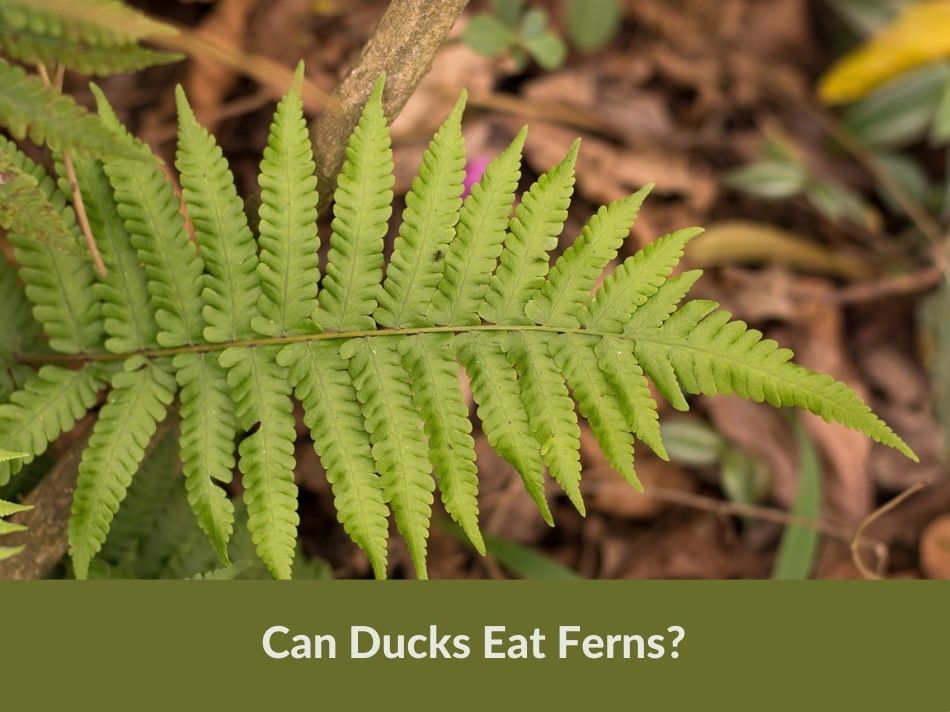Ducks are omnivores, meaning they eat both plants and animals. In the wild, their diet usually consists of insects, worms, small fish, algae, grains and seeds. But, can ducks eat ferns?
The short answer is that it depends on the type of fern and the specific circumstances. Boston ferns and maidenhair ferns are generally considered safe, while bracken ferns are toxic to ducks.
In this comprehensive guide, we explore the topic of whether ducks can safely eat ferns further. We delve into the natural diet of ducks, the anatomy and types of ferns, potential risks, and nutritional considerations.
What Are Ferns?
Ferns are a diverse and ancient group of plants that have been around for more than 360 million years, predating many other types of vegetation including flowering plants. They belong to the division Pteridophyta and are a part of the vascular plant kingdom, meaning they have specialized tissues for the transport of water and nutrients.
Unlike angiosperms, which are flowering plants, ferns do not produce flowers, fruits, or seeds. They reproduce via spores, tiny reproductive units that are usually found on the undersides of the fronds (fern leaves).
Anatomy of a Fern
Understanding the structure of a fern can offer insights into why their edibility is a topic of concern. Here are some key components:
- Fronds: These are the leaf-like structures that you commonly associate with ferns. They uncoil from a curled-up structure known as a fiddlehead.
- Rhizome: This is the stem of the fern, often underground, from which the fronds grow.
- Spores: Located usually on the underside of the fronds, these are the reproductive units of the fern.
- Sori: These are clusters of sporangia, the structures that produce and contain spores.
Habitats and Distribution
Ferns are incredibly versatile when it comes to their living conditions. They can be found in an array of environments, from tropical rainforests and mountain elevations to dry desert landscapes and temperate woodlands.
Some even grow on other plants, rocks, or in aquatic environments. Their adaptability is one reason why they are so widespread.
Types of Ferns
There are numerous species of ferns, and some can be more harmful to ducks than others. Some common ferns and their safety profiles for ducks include:
- Bracken Ferns: These are toxic and should not be ingested by ducks. They contain compounds like ptaquiloside that can cause digestive issues and may even lead to thiamine deficiency.
- Boston Ferns: Generally considered safe and non-toxic to most animals, including ducks. However, they offer little nutritional value.
- Maidenhair Ferns: Also generally safe for ducks, but like Boston ferns, they offer little in terms of nutrition.
Cultural and Historical Significance
Ferns have been used for various purposes throughout history, from medicine and food in some cultures to ornamental plants in gardens and homes. They have a particular significance in the world of botany and ecology for their ability to thrive in a multitude of conditions and their role in various ecosystems.
Potential Risks Of Ducks Eating Ferns
Some risks of allowing ducks to consume ferns are:
- Toxicity: Some ferns contain harmful chemicals that can lead to health issues in ducks.
- Digestive Issues: Some ferns are tough and fibrous, making them difficult to digest.
- Nutrient Imbalance: Ferns are generally low in nutritional content, and feeding them as a staple to ducks can lead to nutrient imbalances.
- Pesticides and Herbicides: If the ferns have been treated with chemicals, they could be harmful to ducks.
Other Plants & Flowers Ducks Can Eat
Certainly, ducks can also enjoy a range of plants along with some flowers, which can be both non-toxic and nutritious. These plants and flowers can offer essential vitamins, minerals, and other important nutrients.
Remember to view our complete list of duck-friendly flowers and plants.
Conclusion
While it may not be entirely harmful for ducks to eat certain types of ferns like Boston or Maidenhair, the general consensus is to steer clear of this food option due to potential risks and lack of nutritional value. Always consult with a veterinarian to get professional advice tailored specifically to your ducks’ needs.
It’s better to stick to foods that are known to be safe and nutritious for ducks, such as leafy greens, fruits, vegetables, and specially formulated duck feed.
Disclaimer: The information in this article is for informational purposes only. I'm not an expert or a veterinarian.


